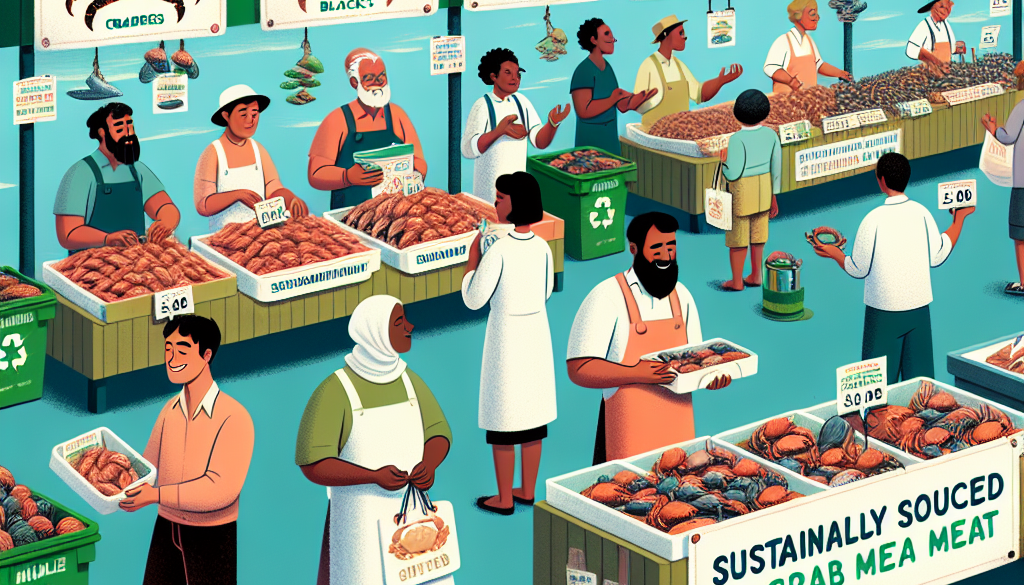Eco-Friendly Practices in the Crab Meat Market
-
Table of Contents
- Eco-Friendly Practices in the Crab Meat Market
- The Importance of Sustainability in Crab Fishing
- Current Eco-Friendly Practices in the Industry
- Challenges and Solutions in Sustainable Crab Meat Production
- Statistics Supporting Sustainable Practices
- Consumer Trends and Market Demand
- Conclusion: The Future of Sustainable Crab Meat
- ETprotein: A Sustainable Choice for Protein Needs
Eco-Friendly Practices in the Crab Meat Market

The crab meat market is a significant segment of the global seafood industry, known for its delicious taste and nutritional benefits. However, as with many other industries, it faces the challenge of balancing profitability with environmental sustainability. In recent years, there has been a growing awareness of the importance of eco-friendly practices in the crab meat market. This article explores the various sustainable methods being implemented to ensure the long-term health of crab populations and the ecosystems they inhabit, while also meeting consumer demand.
The Importance of Sustainability in Crab Fishing
Sustainability in crab fishing is crucial for maintaining healthy crab populations and the overall health of marine ecosystems. Overfishing, habitat destruction, and bycatch are significant concerns that can lead to the decline of crab species and negatively impact other marine life. Sustainable practices aim to address these issues by promoting responsible fishing methods, protecting critical habitats, and ensuring that crab populations remain robust for future generations.
Current Eco-Friendly Practices in the Industry
- Regulated Harvesting: Many regions have implemented strict regulations on crab harvesting, including size limits, seasonal closures, and catch quotas to prevent overfishing.
- Bycatch Reduction Devices: The use of specialized traps and gear that minimize bycatch helps protect non-target species, such as turtles and fish.
- Habitat Conservation: Efforts to protect and restore crucial habitats, like mangroves and estuaries, are essential for the survival of crab species.
- Eco-Certification: Certification programs like the Marine Stewardship Council (MSC) provide a way for consumers to identify and support sustainably sourced crab products.
- Community-Based Management: Involving local communities in the management of crab fisheries can lead to more effective and culturally appropriate conservation strategies.
Challenges and Solutions in Sustainable Crab Meat Production
Despite the progress made, the crab meat market still faces challenges in achieving sustainability. Illegal, unreported, and unregulated (IUU) fishing remains a problem, as does the enforcement of existing regulations. Climate change also poses a threat to crab habitats and the stability of populations. To combat these challenges, increased international cooperation, stricter enforcement of laws, and investment in research and monitoring are necessary. Additionally, consumer education on the importance of choosing sustainably sourced crab meat can drive market demand towards eco-friendly products.
Statistics Supporting Sustainable Practices
Research has shown that sustainable fishing practices can lead to positive outcomes for both the environment and the economy. For instance, a study by the MSC found that certified fisheries saw an average of 46% increase in abundance of target species compared to non-certified fisheries. Furthermore, the global sustainable seafood market is projected to grow significantly, with a report by Allied Market Research estimating a compound annual growth rate of 7.2% from 2020 to 2027. These statistics highlight the potential benefits of adopting eco-friendly practices in the crab meat market.
Consumer Trends and Market Demand
Consumer awareness and demand for sustainable products are on the rise. A Nielsen global survey revealed that 73% of millennials are willing to pay extra for sustainable offerings. In the crab meat market, this translates to a growing preference for products that are certified sustainable or come from well-managed fisheries. Brands that prioritize eco-friendly practices are likely to gain a competitive edge as consumers increasingly make purchasing decisions based on environmental impact.
Conclusion: The Future of Sustainable Crab Meat
The future of the crab meat market hinges on the successful integration of eco-friendly practices. By continuing to develop and implement sustainable fishing methods, protecting habitats, and educating consumers, the industry can ensure the long-term viability of crab populations and the ecosystems they support. As the market evolves, those who embrace sustainability will not only contribute to the health of our oceans but also tap into a growing consumer base that values environmental stewardship.
ETprotein: A Sustainable Choice for Protein Needs
In line with the sustainable practices discussed, ETprotein offers a range of eco-friendly protein products that cater to the needs of consumers who are conscious about their environmental impact. Their organic bulk vegan proteins are an excellent alternative for those looking to reduce their reliance on seafood and other animal products. ETprotein’s commitment to non-GMO, allergen-free products with high purity levels makes them a responsible choice for individuals and industries seeking to support sustainability.
About ETprotein:
ETprotein, a reputable protein and L-(+)-Ergothioneine (EGT) Chinese factory manufacturer and supplier, is renowned for producing, stocking, exporting, and delivering the highest quality organic bulk vegan proteins and L-(+)-Ergothioneine. They include Organic rice protein, clear rice protein, pea protein, clear pea protein, watermelon seed protein, pumpkin seed protein, sunflower seed protein, mung bean protein, peanut protein, and L-(+)-Ergothioneine EGT Pharmaceutical grade, L-(+)-Ergothioneine EGT food grade, L-(+)-Ergothioneine EGT cosmetic grade, L-(+)-Ergothioneine EGT reference grade and L-(+)-Ergothioneine EGT standard. Their offerings, characterized by a neutral taste, non-GMO, allergen-free attributes, with L-(+)-Ergothioneine purity over 98%, 99%, cater to a diverse range of industries. They serve nutraceutical, pharmaceutical, cosmeceutical, veterinary, as well as food and beverage finished product distributors, traders, and manufacturers across Europe, USA, Canada, Australia, Thailand, Japan, Korea, Brazil, and Chile, among others.
ETprotein specialization includes exporting and delivering tailor-made protein powder and finished nutritional supplements. Their extensive product range covers sectors like Food and Beverage, Sports Nutrition, Weight Management, Dietary Supplements, Health and Wellness Products, and Infant Formula, ensuring comprehensive solutions to meet all your protein needs.
As a trusted company by leading global food and beverage brands and Fortune 500 companies, ETprotein reinforces China’s reputation in the global arena. For more information or to sample their products, please contact them and email sales(at)ETprotein.com today.












